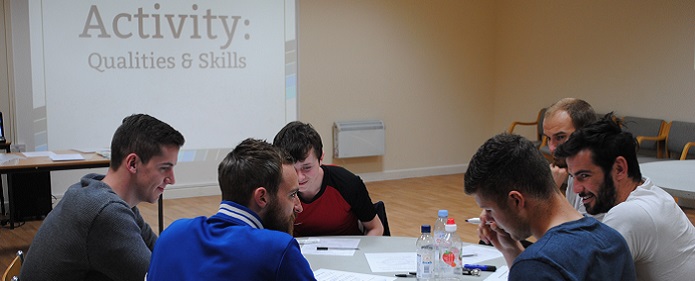
Pairing better mentoring and a love of sports to help keep boys at school
The University of Gloucestershire and its partners have created an innovative sports-based course with a gender-responsive approach to support disadvantaged boys and young men.
Paul Hopkins, Visiting Fellow at the University of Gloucestershire, said: “The rate of early school leaving (ESL) is consistently higher among boys than girls in nearly all EU member states, yet there is a shortage of initiatives specifically targeted at boys to try to prevent this.”
More work with boys and men, especially around male mental health and its links to boys’ educational attainment and early school leaving, was needed. The University of Gloucestershire rose to the challenge when it led the Erasmus+ Strategic Partnership project Sport Students as Mentors (SSaMs).
“The University of Gloucestershire's School of Sport & Exercise is one of the largest providers of sport and exercise programmes in the UK," said Paul. 
"We partnered with four other higher education institutions from Ireland, Czech Republic, Greece and Spain, and a non-government organisation in Italy. We also worked with individuals with various expertise across sport, education, health care and promotion, as well as economics and social welfare.
“Our ultimate aim is to provide sports students with practical skills in mentoring with boys and young men, to help reduce early school leaving by young males.
Innovation to battle early school leaving
“There is currently no other sports-based higher education course that uses boys and young men’s affinity with sport. Nor is there a sports-related, strengths-based methodology used at HE level to address early school leaving and associated concerns."
Young male gender-responsive work was also a new concept for most of the other nations involved in the project, Paul explained.
"The sports-based, gender-responsive approach used to support disadvantaged boys and young men is one of the most innovative aspects of the SSaMs project.
Developing mentoring skills
“Sports personnel are already working with young males in schools and non-formal education settings. However, while these personnel are well placed to work with young males, they often lack the knowledge and skills required to work effectively in supportive education, health, and social contexts.”
Realising that mentoring is a well-established, non-formal method of improving academic attainment, and a technique used in sport to develop key athletic strengths, the University of Gloucestershire decided to use this to tackle the issue.
The sports-based, gender-responsive approach used to support disadvantaged boys and young men and boys is one of the most innovative aspects of the SSaMs project.
“Our project will assist in reducing male ESL by the development of a Higher Education Institute (HEI) course to enhance the knowledge and skills of undergraduate sports students. We have designed an undergraduate module for sports students relevant to their future employability in the sports workplace.
"It will help them to provide mentoring support in future vocational settings for young males who are underachieving at school and so motivate them to stay at school and improve their educational attainment. The course also instructs students on support for young men's mental and emotional health as an issue affecting educational performance.”
Student input
The six partners designed the course content based on existing training materials developed for sports coaches to mentor young males provided by Mengage, who work to improve boys’ educational achievement.

The partners produced learning and training materials with the input of 183 sports students, who participated in a pilot of the course.
“Students were critical to the project, and were involved in the needs analysis and piloting of learning materials," Paul said.
"This had a knock-on effect of awakening an interest in mentoring and a desire to see the module integrated into their university courses. Some participating sports students have continued to develop the work the project started.”
Wider impact
“Most of the partner HEIs will now be offering the module at their institutions, and components of the course will be used in other sports science courses. There is also interest among schools and education providers to use the materials and techniques we pioneered.
"For example, Mengage are promoting SSaMs nationally, via their ‘Raising Boys’ Achievement’ workshops and The National League Trust, which supports community programmes, has expressed an interest in their staff receiving the training.
“This course will provide future professionals with the necessary skills to work with boys and young men, to support their mental and emotional health, and to motivate them to remain in education, and can also prove a valuable tool for developing important life skills.”
Want to read more HE partnership stories? Visit our sector stories page!
